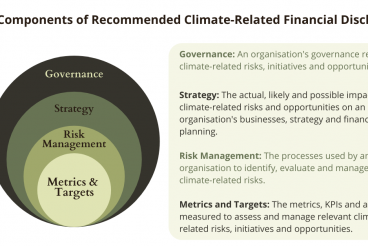The EU’s Sustainable Finance Disclosure Regulation (SFDR), along with the associated Taxonomy Regulation, represent the latest step in an ongoing legislative process that will propel sustainability considerations to the core of the investment sector and by extension the financial industry as a whole. What are the likely future legal consequences for asset managers, intermediaries and service providers? And what are the implications for investment in non-compliant businesses such as fossil fuel extraction and energy generation?

This is the final part of a three-article series published as part of our Sustainability Matters series, in which three legal experts – Leonard Ng (Sidley Austin LLP), Reyhan Gülec (Norton Rose Fulbright) and Sebastiaan Hooghiemstra (Nauta Dutilh) – give their views on how investment strategies may be shaped by the growing body of EU sustainability legislation, the challenges for fund service providers, and the legal implications of comply-or-explain sustainability obligations for investment firms, and in particular their boards. If you haven’t done so already, do check out part 1 and part 2.
Do you expect the window to narrow for investment in non-compliant industries such as fossil fuel extraction and power generation?
In the short term, all three lawyers agree that the SFDR itself will restrict investment in non-compliant industries either slightly or not at all. After all, the regulation does not contain any restrictions on the investments that asset managers, institutions or individual investors can make.
Hooghiemstra notes that the SFDR is structured as a ‘comply-or-explain’ form of legislation focused on preventing greenwashing and pushing financial market participants to be transparent about whether their financial products are genuinely green or not.
In the medium to long term, he believes investment in such industries will diminish, especially as the ESG data sector develops and the technical standards become well established.
In the interim, though, the trend away from investment in non-compliant industries will take a little longer to catch on. For now, requiring asset managers to identify where they stand on sustainability will help make it easier for investors to determine which providers are aligned with their own preferences.
Güleç believes that the Taxonomy Regulation, which will provide criteria to determine which economic activities qualify as environmentally sustainable, should help with this. She hopes the clarification provided by the taxonomy, coupled with increasing shareholder activism, will push financial industry members gradually to adjust their investment policies.
Ng says this is an important first step: “As an increasing proportion of the EU investor community comes to realise the potential impact of their capital allocation decisions on sustainability outcomes, it is possible that the existing trend towards green investing will accelerate.”
He believes that this could make it more difficult for asset managers and others to raise capital for financial products that do not display environmental or social responsibility characteristics or have sustainable investment as their objective.
Güleç says there are some grey areas to iron out on the way, such as whether nuclear power qualifies as sustainable – an argument to which Luxembourg, Germany, Austria and Greece have expressed formal opposition.
The ambiguity on the issue – including whether nuclear fusion energy should benefit from different treatment from existing fission technology, should fusion ever become a viable energy source – will be addressed by an expert technical assessment according to the ‘no significant harm’ principle.
Güleç also points to the ambiguity on inclusion of gas – whether it represented an acceptable transitional step away from the use of higher-carbon fossil fuel sources such as coal.
This will also be subject to a technical assessment before subsidiary legislation in the form of delegated acts is adopted. Further amendments may depend on negotiations between member states and the impact of pressure groups.
On the regulatory side, Hooghiemstra says the progressive implementation of ESG-related incentives will encourage financial product providers to focus more on green assets. He points to the lower rates of subscription tax, graduated according to the sustainability of fund assets, that were introduced in Luxembourg at the beginning of this year.
“We expect further legislative measures to be imposed on institutional investors, such as banks, pension funds, insurance companies and other financial intermediaries, which will be rewarded for investing green,” Hooghiemstra says. “As a result, non-compliant industries are liable to receive less investment.”
How should fund service providers respond to the evolving sustainable investment regime? What risks might they run? How will their services need to adapt?
“The sustainability-driven world demands that fund services providers stay one step ahead of their clients and keep an eye out for regulatory changes, not only from the EU but also in the US and increasingly Asia,” Ng cautions.
While funds and investors are often global in their investment strategy and investor base. there is no global standard for funds to adhere to, nor for their investors, so it will be up to each market participant to stay up to date with the rules impacting their products and services.
They will need support – which should soon be more readily available. Hooghiemstra expects ESG data and due diligence service providers to emerge to fill gaps in the market very rapidly as demand increases: “The industry really needs this data to comply with its obligations, and there is still undersupply.”
Hooghiemstra anticipates that in the medium term, service providers will likely themselves become subject to increased regulatory oversight, since they will be responsible for ensuring that entire value chains and their organisational structures comply with ESG disclosure standards. He warns: “The biggest risk for the industry is for products to be mislabelled” – for firms to categorise products as green under the SFDR when in fact they aren’t. In such instances, auditors, regulators and other gatekeepers would oblige offenders to relabel the product in a less green category; service providers could face regulatory sanctions and very possibly investor lawsuits.
Should investment firms be concerned about the risk of lawsuits arising from climate change, other environmental damage or supply chain practices relating to ESG issues?
Ng says the SFDR and Taxonomy Regulation impose a clear obligation on financial market participants to provide adequate disclosure.
Although in blatant cases of greenwashing or misrepresentation he believes an investor could tryto bring a claim for inaccurate disclosure or misrepresentation, successfully proving consequent loss or damage could be difficult. Rather, he says, an investor in that situation might sue for breach of contract and the return of investment capital.
Under the SFDR, Hooghiemstra says, “sustainability risks are seen as those having a negative financial impact on investments – that have financial consequences in terms of return for the investors from those financial products.”
The danger with the SFDR’s comply-or-explain approach, he says, is that asset managers have the choice whether or not to take sustainability risks into account – but it’s a double-edged sword.
Firms that say they do not consider sustainability risks are in danger of deterring investors, but those that do identify risks that could negatively impact return on investment and require greater risk management must be wary of lawsuits.
Güleç believes that the boards of financial firms should focus on their duties stemming from ESG considerations – especially given the growing trend to add ESG compliance to directors’ fiduciary duties.
She says boards need to formulate relevant ESG policies and practices, including starting to plan short- and long-term compliance strategies and assessing the board’s own ESG expertise and composition, as well as the benefits of creating a dedicated sustainability committee.
Directors should also gauge the board’s adherence to shareholder value expectations, evaluate information channels for obtaining reliable data to assess ESG risks, and define the board’s position regarding its intent to comply with sustainability requirements: adequately, the minimum for compliance purposes, best market practice, or stewardship.
With regard specifically to the SFDR, Güleç says boards must carry out planning for the new obligations at both entity and product level, and decide whether their firm needs to contract ESG consultants to prepare for and meet Sustainable Finance Action Plan requirements. They also need to fill the data gap at product level, classify financial products and analyse underlying economic activities, and draw up a roadmap for meeting the disclosure requirements.
Boards are also responsible for reviewing and if necessary adjusting their firms’ investment strategies and other relevant policies, as well as reorganising internal processes, risk management and control functions.
She says the role of directors may also include negotiating or communicating contractual terms with investors, taking strategic business and investor relations decisions to ensure compatibility of remuneration policies with integration of sustainability risks, and evaluating whether pre-contractual disclosure requirements are addressed in offering documents for existing or new products.
— — —
Reyhan Güleç is an associate in the investment fund and finance practice of Norton Rose Fulbright, specialising in both AIFs and UCITS, and vice-chair of the Board Composition Committee and a member of the Sustainability Strategy for Boards Committee at the Institut Luxembourgeois des Administrateurs. She has published articles on sustainability and gender diversity at board level, and has been working on sustainable finance and ESG matters since 2015.
Leonard Ng is co-head of the UK/EU Financial Services Regulatory group at law firm Sidley Austin and a member of the firm’s executive committee. Based in London, Ng specialises in UK and EU financial services regulatory issues, and has worked closely with clients on sustainable finance and ESG regulation. He has been a member of the board of international hedge fund trade group the Managed Funds Association.
Sebastiaan Hooghiemstra is an associate in the investment fund and financial regulatory practice of Benelux law firm NautaDutilh. He is also a senior fellow at the International Centre for Financial Law & Governance at Erasmus University Rotterdam, where he lectures on UCITS and Alternative Investment Funds. Hooghiemstra, who focuses on fund formation and regulation, has authored more than 60 publications, mostly on investment fund law.
We hope you found this article useful. It is part of our Sustainability Matters series, in which we speak with experts across every facet of sustainability, ESG, sustainable finance, impact investing and more. Stay tuned for more insight from thought leaders, or click the links below to see the content we’ve already published.





